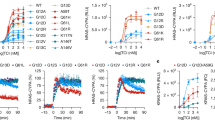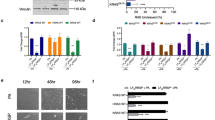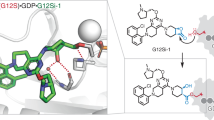Abstract
For Ras oncoproteins to transform mammalian cells, they must be post-translationally modified with a farnesyl group in a reaction catalysed by the enzyme farnesyl-protein transferase (FPTase). Inhibitors of FPTase have therefore been proposed as anti-cancer agents. We show that L-744,832, which mimics the CaaX motif to which the farnesyl group is added, is a potent and selective inhibitor of FPTase. In MMTV-v-Ha-ras mice bearing palpable tumours, daily administration of L-744,832 caused tumour regression. Following cessation of treatment, tumours reappeared, the majority of which regressed upon retreatment. No systemic toxicity was found upon necropsy of L-744,832-treated mice. This first demonstration of anti-FPTase-mediated tumour regression suggests that FPTase inhibitors may be safe and effective anti-tumour agents in some cancers.
This is a preview of subscription content, access via your institution
Access options
Subscribe to this journal
Receive 12 print issues and online access
$209.00 per year
only $17.42 per issue
Buy this article
- Purchase on SpringerLink
- Instant access to full article PDF
Prices may be subject to local taxes which are calculated during checkout
Similar content being viewed by others
References
Barbacid, M. Ras genes. Annu. Rev. Biochem. 56, 779–827 (1987).
Lowy, D.R. & Willumsen, B.M. Function and regulation of ras . Annu. Rev. Biochem. 62, 851–891 (1993).
Adams, J.M. & Cory, S. Transgenic models of tumor development. Science 254, 1161–1167 (1991).
Clark, G.J. & Der, C.J. Ras proto-oncogene activation in human malignancy. in Cellular Cancer Markers (eds Garrett, C.T. & Sell, S.) 17–52 (Humana Press, Totowa, New Jersey, 1995).
Bos, J.L. Ras oncogenes in human cancer: A review. Cancer Res. 49, 4682–4689 (1989).
Gibbs, J.B., C-terminal processing enzymes—new drug targets? Cell 65, 1–4 (1991).
Clarke, S. Protein isoprenylation and methylation at carboxyl-terminal cysteine residues. Annu. Rev. Biochem. 61, 355–386 (1992).
Gibbs, J.B., Oliff, A. & Kohl, N.E. Farnesyltransferase inhibitors: Ras research yields a potential cancer therapeutic. Cell 77, 175–178 (1994).
Patel, D.V. et al. Phosphinyl acid-based bisubstrate analog inhibitors of Ras farnesyl protein transferase. J. med. Chem. 38, 435–442 (1995).
Kohl, N.E. et al. Farnesyltransferase inhibitors block the growth of ras-dependent tumors in nude mice. Proc. natn. Acad. Sci. U.S.A. 91, 9141–9145 (1994).
Sinn, E. et al. Coexpression of MMTV/v-Ha-ras and MMTV/c-myc genes in transgenic mice: Synergistic action of oncogenes in vivo. Cell 49, 465–475 (1987).
Dexter, D.L., Diamond, M., Creveling, J. & Chen, S.-F. Chemotherapy of mammary carcinomas arising in ras transgenic mice. Invest, new Drugs 11, 161–168 (1993).
James, G.L. et al. Benzodiazepine peptidomimetics: Potent inhibitors of Ras farnesylation in animal cells. Science 260, 1937–1942 (1993).
Prendergast, G.C. et al. Farnesyltransferase inhibition causes morphological reversion of Ras-transformed cells by a complex mechanism that involves regulation of the actin cytoskeleton. Molec. cell. Biol. 14, 4193–4202 (1994).
James, G.L., Goldstein, J.L., Pathak, R.K., Anderson, R.G.W. & Brown, M.S. A prenylated protein of peroxisomes. J. biol. Chem. 269, 14182–14190 (1994).
Vogelstein, B. & Kinzler, K.W. The multistep nature of cancer. Trends Genet. 9, 138–141 (1993).
Yamada, H., Yoshida, T., Sakamoto, H., Terada, M. & Sugimura, T. Establishment of a human pancreatic adenocarcinoma cell line (PSN-1) with amplification of both c-myc and activated c-Ki-ras by a point mutation. Biochem. biophys. Res. Commun. 140, 167–173 (1986).
Author information
Authors and Affiliations
Rights and permissions
About this article
Cite this article
Kohl, N., Omer, C., Conner, M. et al. Inhibition of farnesyltransferase induces regression of mammary and salivary carcinomas in ras transgenic mice. Nat Med 1, 792–797 (1995). https://doi.org/10.1038/nm0895-792
Received:
Accepted:
Issue Date:
DOI: https://doi.org/10.1038/nm0895-792
This article is cited by
-
Mutant HRas Signaling and Rationale for Use of Farnesyltransferase Inhibitors in Head and Neck Squamous Cell Carcinoma
Targeted Oncology (2023)
-
Receptor tyrosine kinases and downstream pathways as druggable targets for cancer treatment: the current arsenal of inhibitors
Molecular Cancer (2018)
-
Protein prenylation: unique fats make their mark on biology
Nature Reviews Molecular Cell Biology (2016)
-
Aphanin, a triterpenoid from Amoora rohituka inhibits K-Ras mutant activity and STAT3 in pancreatic carcinoma cells
Tumor Biology (2016)
-
Transformation by HrasG12V is consistently associated with mutant allele copy gains and is reversed by farnesyl transferase inhibition
Oncogene (2014)



